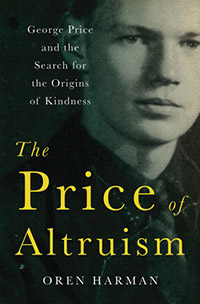
Cool article from The American Scholar, a review of The Price of Altruism: George Price and the Search for the Origins of Kindness, by Oren Harman. Price seems to have been approaching an integral understanding of altruism and natural selection before his religious conversion and subsequent decline: "natural selection works at different levels at the same time, whether among genes, cells, individuals, families, groups, or even species."
The story of George Price's life sounds interesting and sad - but it sounds as though this book doesn't quite work.
Read the rest.Human Kind
Is selflessness in our nature?
From Aesop’s fables to those of La Fontaine, talking animals—monkeys, wolves in sheep’s clothing, grasshoppers, ants—have exposed human foibles and vices and occasional virtues. In so doing, they challenge all rigid boundaries between humans and other species as well as the common view of human wrongdoing as “bestial” in nature—a term Erasmus declared deeply unfair to animals, given the scale of violence and deceit practiced by human beings.
Charles Darwin’s words, near the end of The Descent of Man, might have echoed Erasmus: “I would as soon be descended from that heroic little monkey, who braved his dreaded enemy in order to save the life of his keeper . . . as from a savage who delights to torture his enemies, offers up bloody sacrifices, practices infanticide without remorse, treats his wives like slaves, knows no decency, and is haunted by the grossest superstitions.”
In his engaging book The Price of Altruism: George Price and the Search for the Origins of Kindness, Oren Harman, a professor of the history of science at Bar Ilan University in Israel, presents a wealth of scientific research bearing on forms of cooperation, helpfulness, even self-sacrifice among many species. Altruism was “an anomalous thorn in Darwin’s side,” Harman argues, a conundrum that Darwinians would need to solve, given their view of the ruthless struggle among living beings for survival:
Why do amoebas build stalks from their own bodies, sacrificing themselves in the process, so that some may climb up and be carried away from dearth to plenty on the legs of an innocent insect or the wings of a felicitous wind? Why do vampire bats share blood, mouth to mouth, at the end of a night of prey with members of the colony who were less successful in the hunt?. . . And what do all of these have to do with morality in humans: Is there, in fact, a natural origin to our own acts of kindness?
Harman offers vivid accounts of the lives and writings of a number of evolutionary biologists who have sought answers to such questions, showing how they have intersected with the remarkable career of one man who took questions about altruism to heart as few others have: “the forgotten American genius George Price, atheist-chemist and drifter turned religious evolutionary–mathematician and derelict.” Born in 1922, Price earned a doctorate in chemistry from the University of Chicago, even as he worked on uranium enrichment in the Manhattan Project. He went on to do research at Bell Labs, then at the Radioisotope Lab at the Minnesota Veterans Administration Hospital, and later at IBM, while engaging in often vehement controversies about topics such as extrasensory perception and U.S.-Soviet relations. It was only in 1967, after he moved to London and was appointed to a position at the Galton Laboratory, that he focused ever more intensely on problems of altruism.
In titling his book The Price of Altruism, Harman points to the central part that George Price has come to play in the scientific study of the subject. Exchanges with biologists such as John Maynard Smith and W. D. Hamilton were crucial for Price as he perfected what is now known as the “Price equation.” Harman describes (with three appendices that set forth and elucidate the stages of the equation itself in the context of related ones) how Price arrived at his equation, aiming to explain how natural selection works at different levels at the same time, whether among genes, cells, individuals, families, groups, or even species.
The book’s title also bespeaks the personal cost for Price himself of his struggles during the London years. In 1970, he converted from being a fiercely outspoken atheist to an evangelical Christian on unusual grounds. He felt that there were just too many coincidences in his life to be mathematically possible. They had to have been intended by God, who must have chosen him not only to convert others but also to continue with his research. How did he square his scientific views about evolution with the creation story in Genesis? Providentially, perhaps, he had concluded that God had commanded him not to sign on to belief in that story.
A second conversion experience led him to feel that God wanted him to express his love for others without concern for his own well-being. In a vision, Jesus whispered to him that he should give to all who asked of him and never ask those who took anything from him to return it. He sought out alcoholics and homeless persons, sharing what money and possessions he had, inviting some to share his living quarters. His health deteriorating, hungry and emaciated, sometimes homeless himself, he came to despair of knowing what God meant for him to do or be. In January 1975 he cut a gash in his throat and bled to death on the floor of a desolate squat. Among the notes he left, one read: “To Whom It May Concern: I guess I’ve had it. George.”
No comments:
Post a Comment